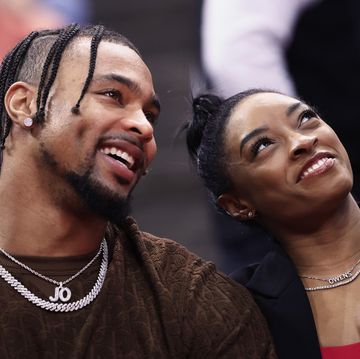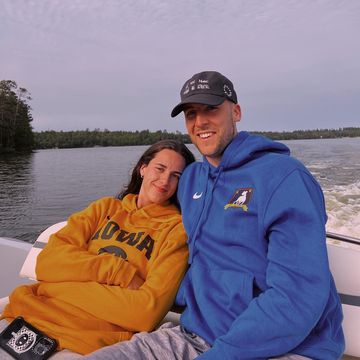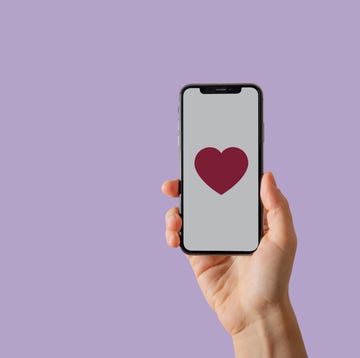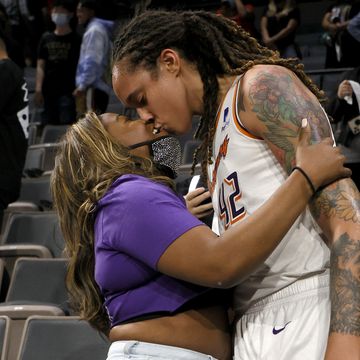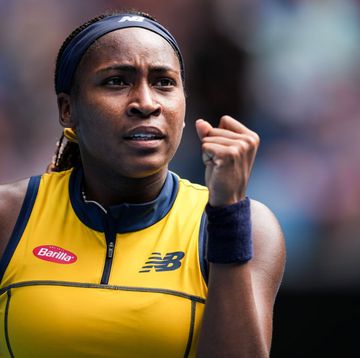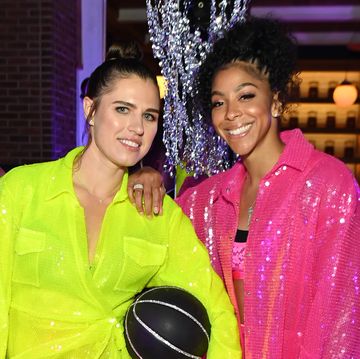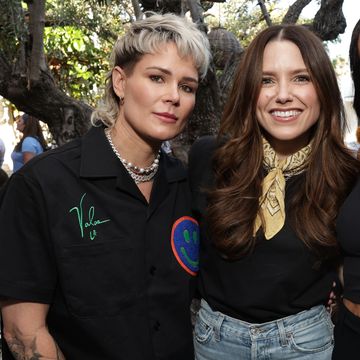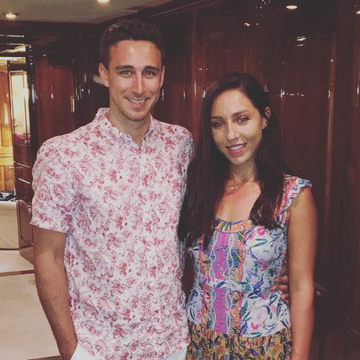Whether you’ve been turned off by a Tinder match, aren’t interested in a second date, or want to decline an invitation from a flirty friend, rejecting someone is about as fun as reading the instruction manual to a vacuum cleaner. Which is, to say, it sucks (pun intended).
But it is necessary for both people to move on with their dating lives. And while figuring out the exact right words to get the message across clearly and compassionately can be tricky, there are some tried-and-true ways to reject someone nicely.
Ahead, relationship experts explain how to tell someone you’re not interested kindly—and even share examples on what to say.
1. Make sure the rejection matches the connection.
Finding the right way to end a romantic interaction isn’t a one-size-fits-all sitch. While you can follow certain guidelines on what to say (like the ones shared in this very article!), you need to “calibrate” your method of rejection according to the level of romantic connection, says Dr. Gary Lewandowski, PhD, psychology professor at Monmouth University and author of Stronger Than You Think: The 10 Blind Spots That Undermine Your Relationship...and How to See Past Them.
With that in mind, here's how much effort you should put into a rejection convo, depending on how much time you've spent getting to know the other person:
- Dating App Messaging: If you only exchanged a few messages on a dating app before realizing you weren’t interested, you can just stop responding, says Lewandowski. Yes, that might qualify as “ghosting,” but contrary to popular belief, it’s not a “rude” way to reject someone, he explains. If you go the opposite route and send a heartfelt rejection message, that may come off as unnecessary and even a bit weird because it's almost like you’re making a point of rejecting someone, rather than just letting this brief connection fizzle out naturally. “In some ways, that's even less kind because you're now making it worse than what it even was,” Lewandowski says.
- Texting/Calling: If you’ve been messaging on an app for several days or graduated to texting/calling, send a short rejection text, like “I’ve enjoyed talking to you, but this isn’t the connection I’m looking for. I wish you all the best.”
- IRL Dates: Once you've made it to an in-person meeting, and you have a good connection (even if it didn't last), that warrants a face-to-face rejection conversation, says Lewandowski. This is especially true if you're ending things with a friend of a friend, so you can avoid potentially awkward run-ins at future social events.
2. Acknowledge and appreciate their vulnerability.
Say you’re approached by someone in a public place, like a bar or a party. Whether it’s a stranger or casual acquaintance, “if someone's asking you out for the first time, acknowledge that you're very flattered, you really appreciate it, but this is just not something that you're interested in,” says Lewandowski. This way, you gently, yet firmly, close the door, rather than slamming it shut in their face.
When rejecting someone, it's also important to consider their perspective. After all, they did take a pretty big risk in putting themselves out there—and it's important to acknowledge that. “Both sides feel respected when we validate the other person's vulnerability,” says Cheryl M. Bradshaw, a registered psychotherapist in Canada and author of Real Talk About Sex and Consent. Consider this a great opportunity to exercise the golden rule and treat this person how you would want to be treated!
Try: “I know it can be hard to put yourself out there, but unfortunately, I'm not interested. I appreciate you asking and being respectful, though.”
An important caveat: The moment someone speaks to you disrespectfully—say, by asking you more than once or trying to change your mind—you should change your strategy. “Be firm, and leave the situation as quickly as you can,” Bradshaw says.
3. Don’t leave breadcrumbs.
How many times have you heard or said "We can still be friends" during a rejection conversation? And how many times did you *actually* want to remain friends with this person? Chances are, you didn't, you were just trying to be nice. “People actually try to soften the blow and be kind in the exact wrong way [by] leaving these breadcrumbs,” says Lewandowski, explaining that the person on the receiving end of rejection will likely look at these sentiments as “a trail to get back to this relationship” when it’s not.
Instead, “it's important to remember that closure is kindness, [and] the kindest thing is to just be clear,” he adds. “As much as rejection hurts, and it certainly does, giving someone the clarity that they need to move on is helpful.”
Try: “As much as I enjoyed our time together, this isn't the connection I'm looking for, and I wish you all the best.”
4. Use a three-pronged approach.
Say you've been on a few dates with someone, and the connection you hoped for just isn't materializing. To reject them kindly, Lewandowski recommends a three-pronged approach:
- Lead with the positives. “The first step is let them know that you enjoyed spending time with and getting to know them,” he says. “You want to make sure the other person hears and realizes that you are acknowledging the good stuff.” The logic: During a rejection convo, if someone wants to hold on to the relationship, they’ll think that the other person isn’t seeing the positives and that's the only reason why they're ending things. But this way, you immediately—and kindly—shut down that line of thinking.
- Take ownership over your feelings. The key to this second step is to speak in “I” terms, like “I’m not finding the connection I was looking for,” so you make it clear that the focus is on you and your needs, rather than anything you didn't like about them. “Don't turn this into an airing of the grievances, because then the conversation turns into focusing on those things,” says Lewandowski. “The other person will typically go into lawyer mode and start fighting you on all those points, which is counterproductive because you already know you're moving on.”
- Give the gift of goodbye. The last part is also the simplest and quickest, per Lewandowski. “Make it crystal clear that you are moving on, this is over, and wish them the best,” he says.
Put it all together: “I really enjoyed spending time with you, but this isn’t the connection I’m looking for. I have a lot of clarity about what I want at this point in my life, and I don't see us as a good match. Wishing you luck finding your person.”
5. Don't apologize.
Whether you’ve gone on a handful of dates or are getting lackluster vibes after a series of exchanges on an app, there's no need to apologize for not being interested. “Don't take more responsibility for things than you should,” says Lewandowski. “You're not responsible for other people's feelings. That's usually what you want to apologize for, [but] you didn't hurt them. You're doing what you need to do for yourself. How they react to it is on them.”
Truth is, you can deliver the textbook perfect rejection—one that is kind, mature, and responsible—and the other person can still have a horrible reaction. But, Lewandowski is quick to remind: “It's not your place to apologize for that because that's on them.”
Try: “I really appreciate your interest and openness, but I’m not able to reciprocate it. I know it may be hard to hear, but I’m not interested in moving forward.”
6. Value your friendship.
It’s never easy disappointing someone, especially when it’s someone you care about as a pal. “If this person is in your social circle or someone you're close with, you likely don’t want to lose the relationship,” says Kaitlin Kindman, LCSW, a Level Two PACT (Psychobiological Approach to Couple Therapy) therapist and the co-founder of Kindman & Co, a Los Angeles-based therapy practice. “Let them know that you see and appreciate their vulnerability and give them space to show that it’s okay for them to feel let down.”
Try: “I hope you know how much I care about you and the relationship we have. I know it’s not easy to share your feelings, and I admire the courage it took to let me know how you’re feeling. I don’t want to hurt you, but unfortunately, I don’t feel the same way. I understand if you feel disappointed and that this may make our relationship awkward for a bit. Take all the time you need and when you’re ready, I hope we can still be friends.”
7. Dispense with the details.
If someone asks you for specific reasons why you’re rejecting them, resist the urge to answer. It can be tempting to offer a detailed explanation because you think that will provide clarity for the other person and ultimately help them when dating someone new. But “even if they say that that's what they want, that is actually not what they need,” says Lewandowski. Whatever the reason(s) behind your rejection, sharing them with the other person will most likely lead them to argue with you about it. Or, it could give them a false sense of hope because they think that if they can fix those one or two specific things you don’t like about them, that will fix everything—when you know it won’t. Instead, if you’re pressed for an explanation, he recommends keep your reasoning vague.
What's more: This technique will also help ensure the other person doesn't “take the rejection personally, because truthfully, it isn't about them,” says Bianca Walker, LPC, a licensed professional counselor in Atlanta. Sure, you might not like certain things about the person you're rejecting, but this usually just means you're incompatible with each other, not that they're a monster. “To somebody else, that same person could be their perfect package,” Walker says. “Rejecting someone in a mean way says, ‘There's something wrong with you,’ which is very different from, ‘I know what I want, and I don't think we're compatible.’”
Try: “There's not any thing I can really put my finger on to be specific about it. I'm just not feeling the kind of connection that I'm looking for.”
8. Focus on your needs, especially with an ex.
When an old flame comes callin’, keep it short and sweet. “Let them know that your focus has shifted,” says Walker. That means, no need to recount details from the past or remind them of how terrible your breakup was.
Instead, “make it less about the former relationship and more about yourself,” says Lewandowski. Simply take ownership of where you’re at in life and what you want going forward, without getting into specifics.
Try: “I'm not the same person I was before, and as much as I appreciate the interest, I've closed that chapter in my life.”
9. Make a clean break.
After you’ve closed the chapter on a romantic connection, the kindest thing you can do for that person is leave them alone. So, block their phone number and social media accounts so you can’t keep reengaging with them. Even if your purpose in reengaging with this person is to underline the fact that the relationship is over, they won’t perceive it that way, says Lewandowski. In fact, it can even give them a false sense of hope because you’re still talking to them and giving them attention, so they may think they still have a chance to revive a flatlined connection.
And while it might seem harsh to totally cut someone off, making a clean break with no contact actually helps the rejected person move on more quickly, says Lewandowski. “Research about breakups shows that it actually creates more emotional pain and turmoil when you keep checking up and keeping tabs on an ex,” he explains. “Every time you text back or answer a call or see them just because you're still friends, you think you're being nice to them, but it's actually making their recovery much more difficult.”
With all these tips in mind, you can both find the good in goodbye!
Meet the Experts: Dr. Gary Lewandowski, PhD, is a psychology professor at Monmouth University, author of Stronger Than You Think: The 10 Blind Spots That Undermine Your Relationship...and How to See Past Them, and co-editor of The Science of Relationships: Answers To Your Questions about Dating, Marriage, And Family. Cheryl M. Bradshaw, a registered psychotherapist in Ontario, Canada and author of Real Talk About Sex and Consent. Kaitlin Kindman, LCSW, is a licensed social worker, a Level Two PACT (Psychobiological Approach to Couple Therapy) therapist, and the co-founder of Kindman & Co, a Los Angeles-based therapy practice. Bianca Walker, LPC, is a licensed professional counselor in Atlanta.

Lindsay Geller is the Lifestyle Director at Women’s Health, where she oversees the Life, Sex & Love, and Relationships sections on WomensHealthMag.com and the Mind section of Women's Health magazine. When she's not writing or editing articles about the latest dating trends and pop culture phenomenons, she's usually watching reality TV or playing with her dog, Lucille (Go Fetch That) Ball.


